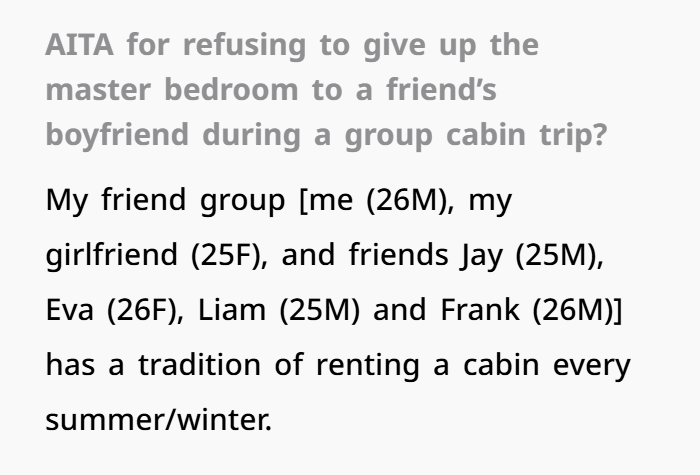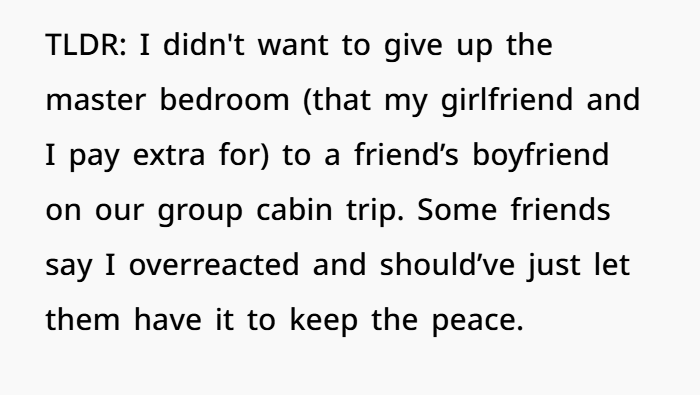Cabin Clash: Was I Wrong for Refusing to Give Up the Master Bedroom to a Friend’s Boyfriend?
What began as a routine, well-loved cabin trip among longtime friends turned tense when an unvetted newcomer disrupted the usual dynamic. The poster, 26M, along with his girlfriend and a core group of friends, have maintained a tradition of sharing a cabin, where he and his girlfriend always pay extra for exclusive use of the master bedroom. This arrangement has been clear, consistent, and mutually accepted. But when Frank, one of the group members, brought along his boyfriend Ed—whom no one had met before—the expectation quickly unraveled. Ed demanded the master bedroom for himself and Frank, dismissing prior arrangements and sparking conflict.
The refusal to accommodate Ed’s demand resulted in accusations of homophobia and fractured the group’s dynamic. Despite having contributed less financially and being new to the group, Ed insisted that he and Frank be prioritized over a couple with a long-standing claim and financial agreement. This situation left the original poster questioning whether defending what was agreed upon made him the villain—or if this was simply a matter of maintaining fairness and boundaries in communal settings.
Navigating group dynamics while on vacation is tricky, especially when routines, roles, or long-standing agreements are challenged

A long-time friend group rented a cabin, as per tradition, with the author and his girlfriend paying extra for the master bedroom as usual












The Psychology of Group Dynamics and Social Equity
Group vacations often reflect intricate social contracts, where mutual respect and pre-established norms are critical to harmony. When those norms are disrupted—especially by someone outside the group’s usual dynamic—tensions often emerge. This scenario mirrors what social psychologists refer to as “equity theory,” which asserts that fairness in social exchanges influences group cohesion. In this case, the original poster (OP) and his girlfriend had long held a recognized role in the group as the couple who financially backed and occupied the master bedroom. When a newcomer attempted to override that agreement without reciprocating the financial or emotional investment, it breached this unspoken contract (Psychology Today).
Group Cohesion vs. Conflict Initiation
Conflict during shared travel experiences is not uncommon. According to a study published in the Journal of Travel Research, group vacations become contentious when expectations aren’t aligned, particularly regarding accommodations and personal space (SAGE Journals). Ed’s refusal to compromise, combined with his expectation to override prior arrangements, created a power imbalance. His discomfort with shared spaces is valid—but demanding a private room without prior discussion and calling dissenters “homophobic” creates a toxic dynamic.

The accusation of homophobia in this context, without evidence of prejudice, risks undermining legitimate LGBTQ+ advocacy. Disagreeing with someone who is gay over shared accommodations doesn’t automatically imply bias, especially when the dispute is rooted in logistics and financial fairness. Leveraging identity to gain preferential treatment, particularly in pre-agreed communal setups, can delegitimize real instances of discrimination and damage trust among allies (The Atlantic).
Boundaries, Assertiveness, and Emotional Labor
The OP’s insistence on maintaining their room was not only about fairness but also about boundaries. As outlined by clinical psychologist Dr. Jenn Hardy, assertiveness in group settings is essential to prevent resentment and burnout, especially when emotional labor is not equitably distributed (Psychology Today). The OP had every right to uphold boundaries in the face of an unreasonable demand, particularly when previous arrangements had been respected by the entire group.
However, tone and timing matter. The escalation late at night and in front of others placed stress on the group. Sometimes, being “right” in principle can still translate to being perceived as inconsiderate in execution. That’s likely why even supportive friends grew uncomfortable with the ongoing argument, emphasizing how timing and delivery are as vital as the content of one’s stance.
The “Plus-One Dilemma” in Group Vacations
Introducing a new partner into a tightly-knit group dynamic can be disruptive, particularly when the newcomer demands changes to established routines. In travel planning circles, this is often referred to as the “plus-one dilemma.” According to travel sociologist Dr. Graham Dann, social harmony in shared spaces depends heavily on mutual compromise and pre-trip communication (Tourism Management Perspectives). Ed’s failure to integrate respectfully—paired with the assumption of entitlement—only amplified group discomfort.
Frank’s responsibility also cannot be ignored. As the person who invited Ed, he should have managed expectations and mediated conflicts. Allowing his partner to assert dominance over shared spaces put undue pressure on the rest of the group and showcased a lapse in group responsibility.
Financial Contributions vs. Entitlement

Another core issue in this story lies in financial contributions and what they entitle someone to. The OP and his girlfriend routinely paid extra for privacy—something that was understood and accepted. Ed’s offer to “cover meals” doesn’t equate to subsidizing the room or making the same financial commitment. Assuming equal entitlement without equal input violates the principle of fairness, which is central to group living arrangements (NerdWallet).
Even in group settings where expenses are shared evenly, deciding who gets what room typically involves pre-trip discussions and sometimes drawing lots. In cases where someone pays extra for a specific amenity, that agreement should be honored unless renegotiated in advance.
Lessons on Conflict Resolution in Shared Spaces
This situation offers several key takeaways for future group travel planning:
- Establish clear agreements beforehand: Clarify room arrangements, expectations, and contributions well in advance.
- Respect established norms: Newcomers should respect existing group dynamics and traditions before asserting changes.
- Don’t weaponize identity in logistical disputes: Serious accusations like homophobia should not be used to win arguments that are fundamentally about space or money.
- De-escalate, don’t dominate: Even when you’re right, approach conflict with measured tone and timing to maintain group cohesion.
- Hosts are responsible for their guests: Friends who invite others should ensure their behavior aligns with group norms and resolve conflicts before they spiral.
Netizens insisted that the author did nothing wrong especially because he and his girlfriend had paid for the room






This was not a matter of bigotry or selfishness, but of expectations and fairness. While OP may have extended the argument unnecessarily, his initial stance was grounded in reason and fairness. Letting emotions run high in a group setting can damage relationships, but so can ignoring clear boundaries. When one person’s discomfort becomes everyone else’s problem, the issue is not inclusion—but entitlement.

